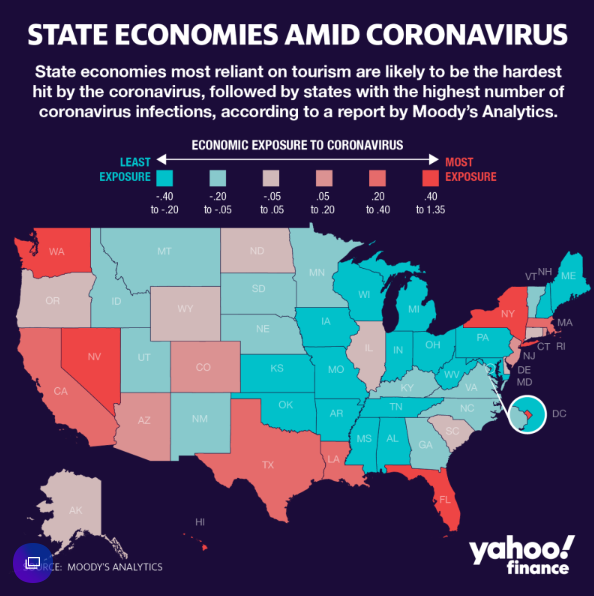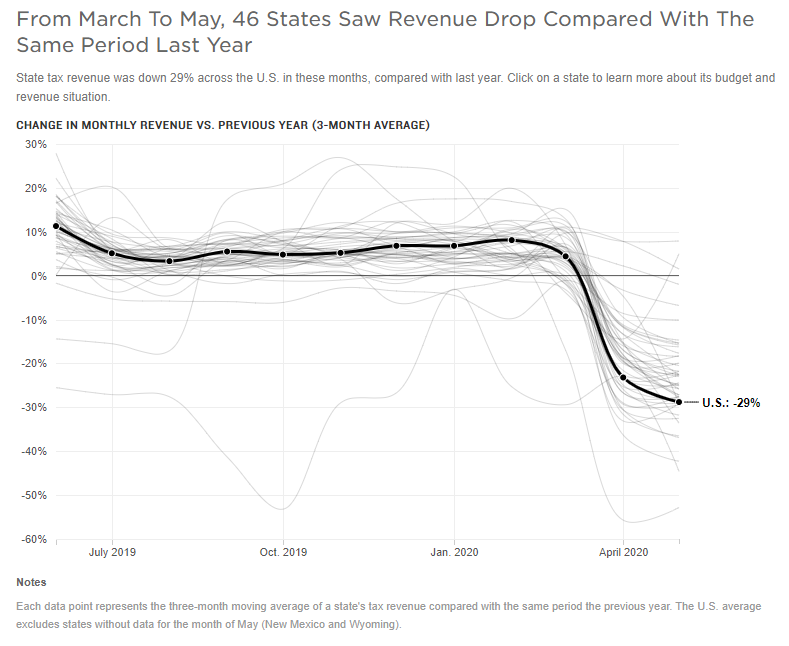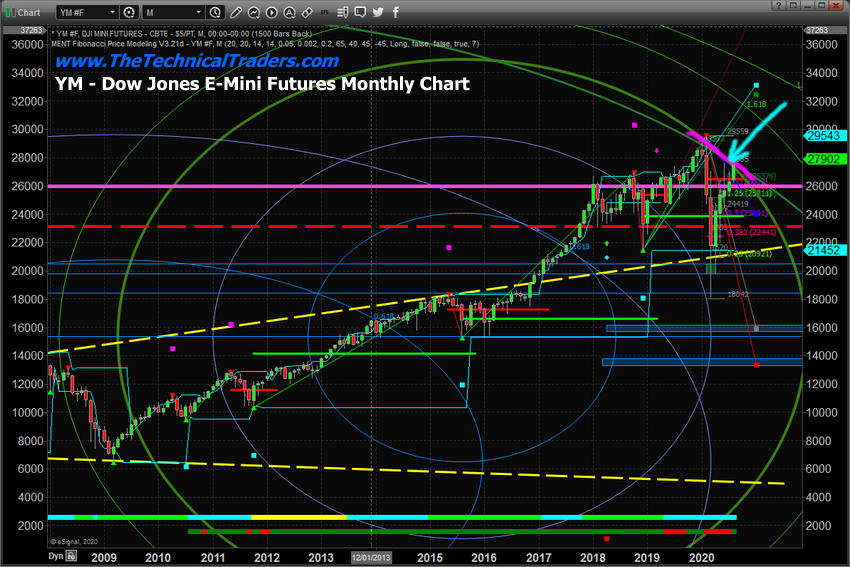As much as we may not want to deal with the reality of the situation, recent news from the state of California suggests it and many other states may be reaching the fiscal boundaries of the COVID-19 economic contraction. The reality of the economic situation is that when consumers are restricted from normal activities, taxes, sales and revenues decrease for the state exponentially. States that depend on consumers and business activity with very large budgets are at greater risk of experiencing immediate fiscal issues the longer the COVID-19 virus event continues. A recent Moody's (NYSE:MCO) Analytics article suggested Nevada, Hawaii, New York, Washington, Florida, DC and Connecticut would be hit the hardest by the COVID-19 virus.
State Finances A Mess
One has to use their imagination to attempt to understand the true scope of the issues ahead for states that experience what we are calling the “COVID Fiscal Cliff.” See the Yahoo! (NASDAQ:AABA) Finance graph below for a view of states that have the most economic exposure to COVID.

Expenses don't stop that much for these states. They've made commitments many years into the future based on budgets and revenue expectations entrenched in the political works of each state. When a contraction of 10%, 20%, 30%, or more is experienced in revenues/income, it can be disastrous. The longer this type of revenue contraction exists, the more painful the Fiscal Death Thrashing for each state is likely to be.
Currently, the revenue levels appear to have decreased by approximately 30% from March 2020 to May 2020, according to a recent NPR article. As we can see from the chart below, the effect on each state varies state-by-state. Regardless, a 25% to 30% drop in revenues will crush many states' future operations – almost immediately.

The article further states:
"Record-high unemployment has wreaked havoc on personal income taxes and sales taxes, two of the biggest sources of revenue for
states. Hawaii's and Nevada's tourism industries have crashed, and states like Alaska, Oklahoma and Wyoming have been hit by the collapse of oil markets. From March through May of this year, 34 states experienced at least a 20% drop in revenue compared with the same period last year."
When one looks at the U.S. stock market reaching new all-time highs and expecting a continued “V-shaped” recovery, we believe the expectations many traders/investors have may be grossly inaccurate given state revenue data.
Credit, Debt And A Lack Of Real Income
Consumers make up nearly 80% of the U.S. total GDP. Certainly, a 20% to 30% decrease in consumer spending and activity will dent state and local city revenue sources. When we consider the huge wave of foreclosures, evictions and job losses that are still pending to hit the economy, we are likely looking at tens of millions of U.S. citizens being displaced or disqualified from consumer activity. This process will likely take 24+ months to fully materialize, yet we are only 5+ months into the process right now.
What happens to the support systems, housing, and how consumers engage in economic activity when states and cities have reached their limits and start cutting budgets and services?
What happens to the stock market when investors suddenly realize the total scope of the true economic environment ahead?
Will they be as aggressive in buying assets and stocks as they have been over the past 5+ months?
One thing is certain, we have yet to identify and experience the total impact of the COVID-19 economic contraction yet – get ready for a “reality shock.” Our research team believe the Fibonacci Price Amplitude Arcs, shown below on this YM Monthly chart, are key to understanding how and where price risk may become excessive.
Currently, price levels are trading just above the two GREEN Fibonacci Price Amplitude Arcs.

If the economy continues to recover at a moderate pace, then we may see further upside price activity from these levels. Yet, with only about 80 days to go before the U.S. Presidential
elections and with late summer/early fall economic cycles in place, our researchers believe the next phase of the economic contraction will come when consumers/cities/states start to become burdened with the lack of income and economic activity related to the COVID-19 virus event. We believe that process is starting to unfold right now.
States and cities that suddenly find themselves broke, or close to being broke, suddenly start acting differently – as we all do. We start to become more “protectionist” in our thinking. Whereas, prior to being broke, we could spend and enjoy different things. Now, being broke, means we can't spend and enjoy – heck we may not even be able to pay for essential services or to keep the lights on.
A perfect example of the Economic Death Spiral event that often takes place when cities/states destroy their economic future is what is being reported in New York City. People with the means and ability are fleeing New York City “in droves” and the mayor is pleading with these wealthy residents to “stay.” The only people that may eventually be left are those that don't have the resources to leave.
These near all-time highs may seem like a very good opportunity for buying before the breakout, but we urge everyone to stay cautious because we believe a broader, longer-term cycle is taking place and we are just at the start of this potentially 24+ month cycle. Yes, the Fed can print lots of money and spread it around, but consumers and assets need to be engaged in real organic economic function for the economy to grow. If the Fed continues to attempt to buy up everything, this is not real organic growth. It is “life support."
